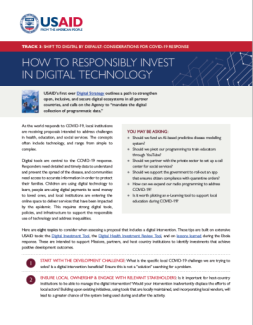As the world responds to COVID-19, local institutions are receiving proposals intended to address challenges in health, education, and social services. The concepts often include technology, and range from simple to complex.
You may be asking:
- Should we fund an AI-based predictive disease modelling system?
- Should we pivot our programming to train educators through YouTube?
- Should we partner with the private sector to set up a call center for social services?
- Should we support the government to roll-out an app that ensures citizen compliance with quarantine orders?
- How can we expand our radio programming to address COVID-19?
- Is it worth piloting an e-Learning tool to support local education during COVID-19?
Digital tools are central to the COVID-19 response. Responders need detailed and timely data to understand and prevent the spread of the disease, and communities need access to accurate information in order to protect their families. Children are using digital technology to learn, people are using digital payments to send money to loved ones, and local institutions are entering the online space to deliver services that have been impacted by the epidemic. This requires strong digital tools, policies, and infrastructure to support the responsible use of technology and address inequalities.

